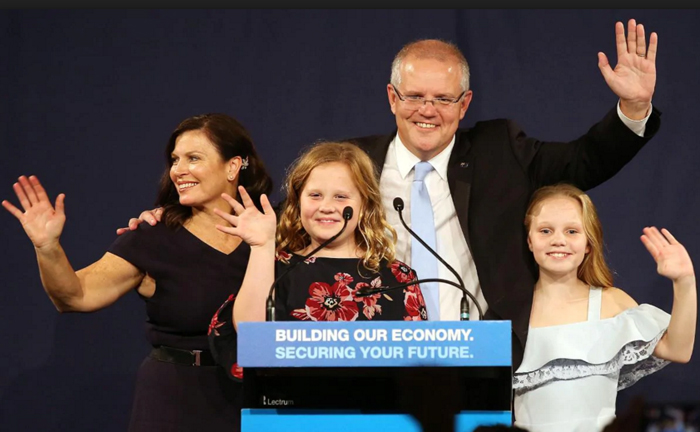Dark clouds are looming above Scott Morrison’s glittering election victory.

The death of Bob Hawke, the political deaths of Tony Abbott and Bill Shorten, and the tub-thumping revival of Scott Morrison have left Australia divided and disoriented in a climate policy vacuum.
Amid all that sound and fury, a more momentous milestone passed almost unnoticed last week. Across the Pacific in Hawaii, Mauna Loa atmospheric observatory recorded carbon dioxide levels above 415 parts per million for the first time in its 71 years of records.
In itself, this is not huge. Every year about this time there is a spike in carbon dioxide because of the dominant influence of the annual cycle of growth and decay of Northern Hemisphere land plants, and the current peak reading was entirely predictable.
What is huge is what this sustained and accelerating rising trend – which last year alone saw about 4.25 billion tonnes of carbon emitted to the atmosphere – implies for our future climate.
Leaders who boast about containing emissions need to know this. For the past 60 years greenhouse gases in the global atmosphere have been accumulating over 100 times more rapidly than in any earlier time. The rise of over 3 ppm in 2018 was the fastest ever known.
Earth has not seen this level of carbon dioxide in its atmosphere for at least three million years – more than 15 times longer than humans have existed on Earth, when temperatures were at least 5C higher than today and, with little land ice, sea levels were several tens of metres higher.
Given the lag time between rising CO2 and temperature, portents for human and ecosystem wellbeing, not to mention coastal life and infrastructure, are ominous indeed.
Other ominous signs are appearing daily. Two random examples from last week: unprecedented May heat in the Arctic (29C at Arkhangelsk in far northern Russia for instance) and warming Antarctic seas causing ice shelves to melt several times more quickly than previous estimates.
For many years I nursed the hope that such warnings from science, repeated often enough, would eventually enable everyone to see we needed stronger action on climate, but I was wrong. Much more important is lived experience. We are now getting that in spades.
Each passing year has brought record-breaking weather events. Summer heatwaves, bushfires, prolonged warm conditions, sustained drought, intense rainstorms and huge floods have brought a new urgency to the debate. Voters everywhere know in their hearts that we have a problem.
Queensland aside, climate policy played a bigger part in this year’s election than ever before. It caused the ousting of Tony Abbott, and is top priority for four independents elected to a finely-balanced lower house.
In the new parliament, expect less negativity about electric cars, wind and solar power, possibly stronger emissions and renewable energy targets and even carbon pricing. But on present indications this will amount to no more than tolerance.
“All politics is local,” Labor leadership contender Anthony Albanese told supporters on Saturday night after winning his seat by a huge majority. Scott Morrison knows this as well as any, exploiting it brilliantly in a focused, targeted, supremely disciplined campaign.
As a campaigner Bill Shorten was no match for Morrison. For all its carefully stage-managed campaign and the Coalition’s deep divisions, Labor had no counter to negative tactics that targeted with pinpoint precision the Labor leader’s every weakness or misstep.
But the story does not end here. We accept voters’ choice in a fair election because that’s how democracy works, but we also know from Donald Trump’s election in the US and Nigel Farage’s Brexit win how electoral outcomes can go horribly pear-shaped.
Lauded in 2016 for their winning styles and strategies, both men still claim to be a force for good in their respective countries. But those fateful votes have left a very dark cloud over the rule of law and stable democratic institutions in the US and the UK.
Scott Morrison’s natural talents lend themselves to this kind of situation in Australia. His salesman’s patter has glossed over contradictions inherent in our national polity that have put Australia on course for its own, home-grown crisis.
Celebrating victory, Barnaby Joyce cited the Adani coal mine controversy and farmers’ knowledge of life on the land to claim Labor was out of touch with the bush. That seemed to be borne out by the big Queensland swing and Labor’s failure to win support in NSW, Victoria and South Australia.
But the combined issues of Adani and Murray-Darling basin administration (Joyce’s former ministerial responsibility) have the makings of a perfect storm. Unresolved environmental, financial and legal risks are attached to Carmichael, while the Murray-Darling is on course to become a natural disaster rivalling catastrophic bleaching of the Great Barrier Reef.
While appearing to support new Queensland coal mines with their disturbing implications for global emissions, the prime minister would have us believe that his current climate policies are adequate.
Morrison’s electoral wizardry has got him this far, but now he must confront the real world. His government is woefully unprepared for the multi-dimensional, multi-jurisdictional emergency that is steadily descending upon us.
